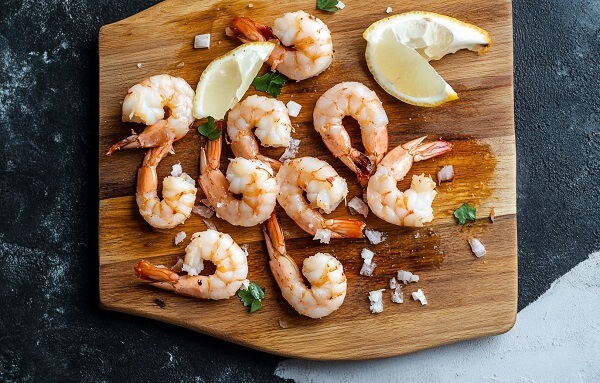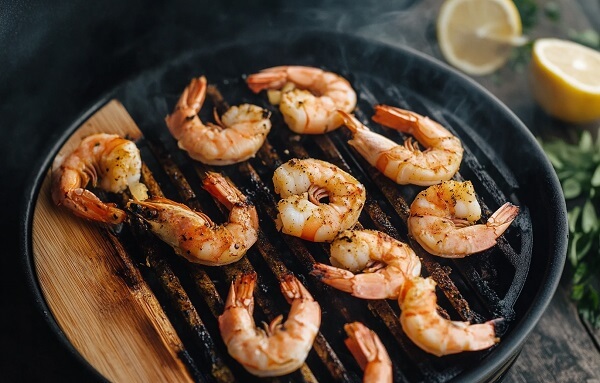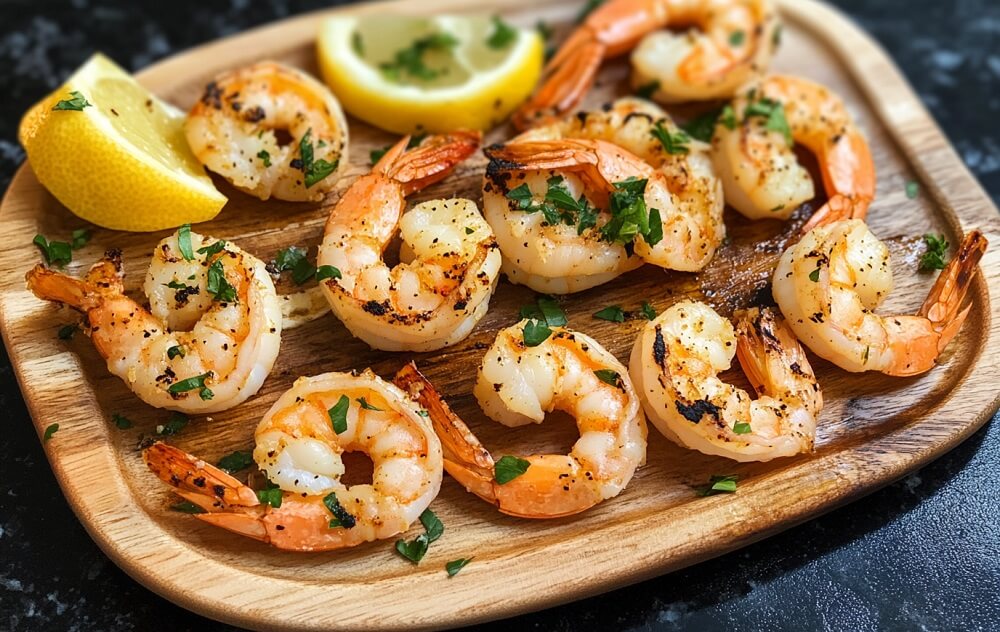Grilled shrimp is a favorite for summer cookouts, but knowing how to grill shrimp without drying it out can be tricky. Shrimp cooks quickly, and it’s easy to overdo, leaving you with dry and rubbery results instead of the juicy grilled shrimp you crave.
In this guide, we’ll share expert techniques to master the perfect grilled shrimp recipe, from selecting the right size shrimp to using the best marinades and grilling techniques. Whether you’re looking for quick tips or a delicious lemon butter shrimp recipe, you’ll find all the tools you need to ensure your shrimp stays tender, flavorful, and moist.
Why Does Shrimp Dry Out on the Grill?
Shrimp can go from perfectly juicy to dry and rubbery in seconds. Understanding why this happens can help you adjust your grilling techniques for the best results.
1. High Heat and Short Cook Time Lead to Overcooking
- Shrimp is naturally delicate and cooks extremely fast.
- Exposing shrimp to high heat for too long causes it to lose moisture.
- The ideal shrimp cooking temperature is medium-high heat (around 375-400°F), cooking for just 2-3 minutes per side.
2. The Delicate Nature of Shrimp
- Shrimp lacks the fat content that keeps other proteins moist during grilling.
- Overcooking shrinks the shrimp, leaving it rubbery instead of juicy grilled shrimp.
3. Shrimp Size Matters – Why Large Shrimp Are Better
- Grilling large shrimp is key to achieving tender and moist results.
- Larger shrimp (like 21-25 count per pound) have more surface area, making them less likely to dry out.
- Smaller shrimp cook too quickly, increasing the risk of overcooking.
By selecting the right shrimp size and carefully monitoring the shrimp cooking temperature, you can enjoy a grilled shrimp recipe that’s bursting with flavor.

Choosing the Right Shrimp for Grilling
The type of shrimp you choose significantly impacts the flavor, texture, and ease of grilling.
1. Fresh vs Frozen Shrimp: Advantages of Each
- Fresh Shrimp: Ideal if you live near the coast. Fresh shrimp offers the best natural flavor but can spoil quickly.
- Frozen Shrimp: A great option for most. Frozen shrimp is flash-frozen immediately after catching, preserving its freshness. It’s perfect for a quick grilled shrimp recipe when time is tight.
2. Wild-Caught vs Farmed: Taste and Texture Differences
- Wild-Caught Shrimp: Known for its clean, sweet flavor and firm texture, making it perfect for juicy grilled shrimp.
- Farmed Shrimp: More readily available but can lack the same depth of flavor as wild-caught shrimp. Look for sustainable farmed options.
3. Ideal Shrimp Size
- For grilling, always choose 21-25 count per pound shrimp or larger.
- Larger shrimp hold up better on skewers and are less prone to overcooking, making them ideal for a barbecue shrimp tips recipe.
4. Prepping Shrimp: Deveining, Peeling, and Cleaning
- Deveining: Remove the dark vein along the back to ensure clean flavor.
- Peeling: Peel the shrimp fully for better seasoning or leave the tails on for easier handling when learning how to grill shrimp skewers.
- Pat Dry: Always pat the shrimp dry before marinating to help the shrimp marinade for grilling stick better and ensure a nice sear.
By choosing the right shrimp and preparing it properly, you’re one step closer to mastering a lemon butter shrimp recipe that’s grilled to perfection.
How to Season Shrimp Before Grilling
Proper seasoning is key to achieving juicy grilled shrimp while ensuring the shrimp stays tender and flavorful. Seasoning not only enhances taste but also locks in moisture during grilling, preventing the shrimp from drying out.
The Importance of Seasoning
- Shrimp has a mild, delicate flavor that benefits from marinades and rubs.
- Proper seasoning helps the shrimp develop a beautiful char while staying moist and flavorful.
- Adding fats, like olive oil or butter, in your shrimp marinade for grilling helps retain moisture and adds a rich taste.
Marinades for Grilled Shrimp
Marinades are a popular choice for adding flavor while keeping shrimp moist. Here are three versatile marinades to elevate your grilled shrimp recipe:
- Lemon-Garlic Olive Oil
- Ingredients: Olive oil, fresh lemon juice, minced garlic, salt, and black pepper.
- Why it Works: The olive oil prevents drying out, and garlic and lemon create a bright, aromatic flavor.
- Smoky Paprika Rub
- Ingredients: Smoked paprika, garlic powder, onion powder, olive oil, and a pinch of cayenne.
- Why it Works: Paprika adds a smoky depth, perfect for creating barbecue shrimp tips flavor.
- Spicy Cajun Marinade
- Ingredients: Olive oil, Cajun seasoning, garlic, and a dash of hot sauce.
- Why it Works: Adds a bold, zesty kick to your quick grilled shrimp recipe.
Dry Rubs vs Marinades: Pros and Cons
- Dry Rubs:
- Pros: Quick to prepare, no need for resting time, and ideal for achieving a nice crust.
- Cons: Less effective at locking in moisture.
- Marinades:
- Pros: Infuses the shrimp with flavor and moisture. Ideal for grilling large shrimp.
- Cons: Requires 15-30 minutes of resting time and can become mushy if marinated too long.
Avoiding Acid Overkill: Why Marinades with Citrus Should Be Short
- Marinades containing acidic ingredients, like lemon juice or vinegar, should be used for no more than 15-30 minutes.
- Acid breaks down the delicate shrimp proteins too quickly, resulting in a mushy texture instead of juicy grilled shrimp.
- For the best lemon butter shrimp recipe, use citrus sparingly and combine it with fats like olive oil or butter.
By choosing the right seasoning and understanding the balance of marinades and dry rubs, you’ll ensure your shrimp marinade for grilling produces perfectly seasoned, moist shrimp every time.

The Best Techniques for Grilling Shrimp
Perfecting the grilled shrimp recipe relies on mastering the proper techniques. By following these steps, you can ensure tender, juicy grilled shrimp every time.
Step-by-Step Grilling Instructions
- Preheat the Grill to Medium-High Heat
- Heat your grill to 375-400°F for consistent cooking.
- Medium-high heat is ideal to quickly cook shrimp without drying it out.
- Skewer Shrimp Properly
- Use two skewers per row of shrimp to keep them from spinning. This makes flipping easier and ensures even cooking.
- Insert the skewer through the thickest part near the tail and then through the head to stabilize the shrimp.
- Grill Time: 2-3 Minutes Per Side
- Shrimp cooks quickly, so monitor closely. Grill for 2-3 minutes per side, flipping only once.
- Shrimp are done when they turn opaque and curl into a “C” shape. Overcooking will cause the shrimp to become rubbery.
How to Prevent Sticking
- Properly oil the grill grates before cooking.
- Dip a folded paper towel in olive oil or vegetable oil, and use tongs to rub the grates.
- This prevents sticking and allows for clean flipping.
- Make sure the shrimp are dry before marinating and grilling, as excess moisture increases sticking.
To Shell or Not to Shell: The Pros of Shell-On Shrimp
- Shell-On Shrimp:
- Protects the shrimp from direct heat, preventing moisture loss.
- Adds a richer, slightly smoky flavor.
- Shell-Off Shrimp:
- Allows marinades or seasonings to penetrate the meat more effectively.
- Easier to eat, especially for a quick grilled shrimp recipe.
Tip: For a balance, leave the tails on for easier handling while grilling.
Using Wooden or Metal Skewers: Tips for Both
- Wooden Skewers:
- Soak in water for at least 30 minutes before grilling to prevent burning.
- Great for single-use and easy cleanup.
- Metal Skewers:
- Reusable and durable, but they get very hot. Use heat-resistant tongs when flipping.
By following these barbecue shrimp tips, you’ll ensure your shrimp marinade for grilling and grilling techniques deliver perfectly tender shrimp every time.
The Role of Butter and Other Fats for Moisture
Adding fats, like butter or oil, during grilling enhances flavor and keeps shrimp moist. Fats create a protective coating, locking in juices for juicy grilled shrimp.
Basting with Butter During Grilling
- Basting shrimp with melted butter during grilling ensures a rich, flavorful finish.
- Butter helps prevent shrimp from drying out and adds a smooth texture.
Lemon-Parsley Butter Recipe
For a delicious and quick lemon butter shrimp recipe:
- Melt 4 tablespoons of unsalted butter.
- Mix in 1 tablespoon of fresh lemon juice and 1 tablespoon of chopped parsley.
- Brush the butter mixture over the shrimp while grilling for a burst of flavor.
Other Fat Options: Garlic-Infused Olive Oil
- Combine olive oil with minced garlic, salt, and a pinch of smoked paprika.
- Brush the shrimp with this oil while cooking to add depth and prevent sticking.
Whether using butter or garlic-infused olive oil, these fats ensure your grilled shrimp recipe turns out tender, flavorful, and perfect for any occasion.
Alternative Methods: Oven and Stovetop Grilling
If outdoor grilling isn’t an option, you can still achieve juicy grilled shrimp using alternative methods. Both the oven and stovetop can replicate the same flavors and textures of a grilled shrimp recipe with a few simple adjustments.
Grilling in the Oven: Broiling Instructions
Broiling in the oven is a great substitute for outdoor grilling, as it mimics the high, direct heat.
- Preheat the Oven: Set your oven to broil (high setting) and position the oven rack about 6 inches from the heat source.
- Prepare the Shrimp: Place the marinated shrimp on a foil-lined baking sheet for easy cleanup. Skewer the shrimp or spread them in a single layer.
- Broil the Shrimp: Cook for 2-3 minutes per side, flipping once halfway through. Shrimp should turn opaque and slightly charred.
- Brush with butter or oil during cooking for extra flavor and moisture.
Stovetop Grilling: Using a Grill Pan
A grill pan is perfect for achieving those signature grill marks while cooking indoors.
- Preheat the Pan: Heat a grill pan over medium-high heat and lightly grease with olive oil to prevent sticking.
- Cook the Shrimp: Arrange the shrimp in a single layer. Cook for 2-3 minutes per side, flipping once.
- Use a basting brush to apply lemon butter or garlic-infused olive oil for added flavor and moisture.
- Shrimp are ready when they curl into a “C” shape and are firm to the touch.
Both methods deliver a quick, flavorful quick grilled shrimp recipe without the need for outdoor grilling.
Best Side Dishes to Serve with Grilled Shrimp
Pairing shrimp with complementary side dishes elevates the entire meal. Here are some versatile options:
- Grilled Vegetables:
- Zucchini, bell peppers, asparagus, or cherry tomatoes grilled alongside shrimp create a healthy and colorful platter.
- Rice and Grain Bowls:
- Serve shrimp over seasoned rice, quinoa, or couscous. Add fresh herbs, lemon juice, and roasted vegetables for a balanced meal.
- Salads with Fresh Citrus Dressings:
- A light salad with arugula, spinach, or mixed greens pairs perfectly with shrimp. Top with a citrus vinaigrette and avocado slices.
- Garlic Bread and Cornbread:
- Soft, buttery garlic bread or moist cornbread is perfect for soaking up any lemon butter shrimp recipe juices.
These sides are quick, easy, and enhance the flavors of any grilled shrimp recipe. Whether you’re preparing a family meal or entertaining guests, these dishes are sure to please!
Common Grilling Mistakes and How to Avoid Them
Grilling shrimp seems simple, but a few common mistakes can lead to dry, rubbery results. Avoid these pitfalls for perfectly juicy grilled shrimp every time.
1. Overcooking Shrimp
- Shrimp cook very quickly—only 2-3 minutes per side.
- Overcooked shrimp become tough and rubbery. Watch for shrimp to turn opaque and curl into a “C” shape.
2. Forgetting to Pat Shrimp Dry
- Moisture prevents proper seasoning and creates steam, which ruins the sear.
- Pat the shrimp dry with a paper towel before applying the shrimp marinade for grilling.
3. Not Preheating the Grill
- A cold grill causes shrimp to stick and cook unevenly.
- Always preheat your grill to 375-400°F for an even sear and to lock in moisture.
4. Using Too Much or Too Little Seasoning
- Over-seasoning can overwhelm the delicate shrimp flavor.
- Too little seasoning results in bland shrimp. Use balanced marinades like lemon butter shrimp recipe or smoky paprika rub for optimal flavor.
By avoiding these mistakes, you’ll master any grilled shrimp recipe and impress your guests with perfectly cooked shrimp.
Frequently Asked Questions (FAQs)
1. How Long Should I Grill Shrimp?
- Grill shrimp for 2-3 minutes per side at medium-high heat (375-400°F). Overcooking will make the shrimp dry and rubbery.
2. Should Shrimp Be Marinated Before Grilling?
- Yes, marinating shrimp enhances flavor and keeps them moist. However, avoid marinating for more than 30 minutes, especially with acidic ingredients.
3. Can I Grill Shrimp Without Skewers?
- Yes, you can grill shrimp directly on the grates. To prevent sticking, oil the grill and ensure the shrimp are large enough to avoid falling through.
4. How Can I Tell When Shrimp Is Done Cooking?
- Shrimp turn opaque and curl into a “C” shape when done. The center should no longer appear translucent.
5. Is It Better to Grill Shrimp With the Shell On?
- Shell-on shrimp retain more moisture and flavor. However, shell-off shrimp absorb seasonings better and are easier to eat.
Conclusion
Grilling shrimp is an easy and quick way to enjoy delicious, tender seafood. By following key techniques—like preheating the grill, using a shrimp marinade for grilling, and cooking for just 2-3 minutes per side—you can achieve perfectly juicy grilled shrimp without drying it out.
Don’t be afraid to experiment with flavors like a lemon butter shrimp recipe or smoky paprika rub, and pair your shrimp with complementary sides for a complete meal. Learning how to grill shrimp without drying it out is the key to elevating your barbecue game.
Now that you’re equipped with these barbecue shrimp tips, fire up the grill and put your skills to the test! Share your grilling experiences and favorite recipes with us in the comments below. Happy grilling!






